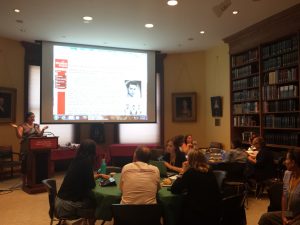~Post courtesy Stephen Greenberg, Section Head, Rare Books and Early Manuscripts History of Medicine Division, National Library of Medicine.
You are cordially invited to the next NLM History of Medicine lecture, to be held on Thursday, March 1, from 2:00pm until 3:30pm in the NLM Lister Hill Auditorium, Building 38A, National Library of Medicine, Bethesda, MD. NLM Director Patricia Brennan, RN, PhD will host “A Conversation About Graphic Medicine” with pioneers from this emerging genre of literature that combines the art of comics and the personal illness narrative.
Dr. Brennan will be joined in conversation by Ellen Forney, cartoonist, educator, author of the New York Times bestselling graphic memoir, Marbles: Mania, Depression, Michelangelo and Me, and guest curator of the new NLM exhibition, Graphic Medicine: Ill-Conceived and Well-Drawn!; MK Czerwiec, RN, MA, Artist-in-Residence at Northwestern Feinberg School of Medicine, author of Taking Turns: Stories from HIV-AIDS Care Unit 371, and co-manager of GraphicMedicine.org; and Michael Green, MD, physician, bioethicist, and professor at Penn State University’s Milton S. Hershey Medical Center, and co-author with MK Czerwiec and others, of The Graphic Medicine Manifesto.
“A Conversation About Graphic Medicine” will address the place of graphic medicine within medical literature and the landscape of personal health communication in the 21st century. This special public program is in conjunction with the new NLM exhibition, Graphic Medicine: Ill-Conceived and Well-Drawn! on display in the History of Medicine Division Reading Room on the first floor of the NLM, Building 38 and online here: www.nlm.nih.gov/graphicmedicine.
This lecture, like all NLM History of Medicine Lectures, will be free, open to the public, live-streamed globally, and subsequently archived, by NIH VideoCasting. All are welcome to attend onsite and remotely:
https://www.nlm.nih.gov/hmd/lectures/index.html
The specific live-stream URL for this talk is here: https://videocast.nih.gov/summary.asp?live=26989&bhcp=1
Sign language interpretation is provided for all lectures. Individuals with disabilities who need reasonable accommodation to participate may contact Erika Mills at 301-594-1947, Erika.Mills@nih.gov, or via the Federal Relay (1-800-877-8339).
Due to current security measures at NIH, off-campus visitors are advised to consult the NLM Visitors and Security website:
http://www.nlm.nih.gov/about/visitor.html
In addition, we warmly welcome you to visit our blog, Circulating Now, where you can learn more about the collections and related programs of the NLM’s History of Medicine Division, and watch for interviews with guest participants in the upcoming Conversation about Graphic Medicine:
http://circulatingnow.nlm.nih.gov/
Here also you can read interviews with previous lecturers:
http://circulatingnow.nlm.nih.gov/tag/lecture/
Sponsored by:
NLM’s History of Medicine Division
Jeffrey S. Reznick, PhD, Chief
Event contact:
Erika Mills
301-827-4577






